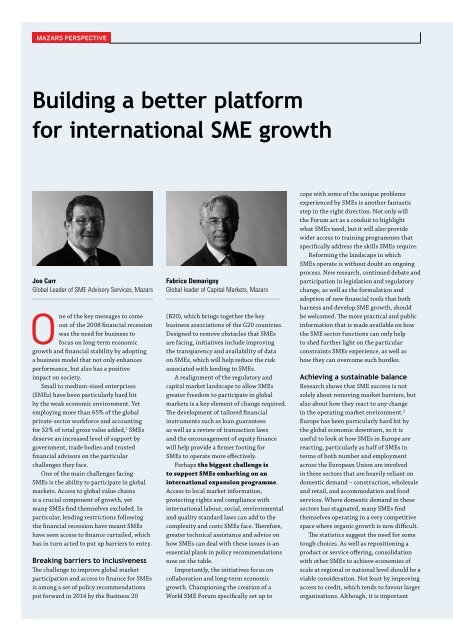G20-2015 Turkey
Create successful ePaper yourself
Turn your PDF publications into a flip-book with our unique Google optimized e-Paper software.
MAZARS PERSPECTIVE<br />
Building a better platform<br />
for international SME growth<br />
Joe Carr<br />
Global Leader of SME Advisory Services, Mazars<br />
One of the key messages to come<br />
out of the 2008 financial recession<br />
was the need for business to<br />
focus on long-term economic<br />
growth and financial stability by adopting<br />
a business model that not only enhances<br />
performance, but also has a positive<br />
impact on society.<br />
Small to medium-sized enterprises<br />
(SMEs) have been particularly hard hit<br />
by the weak economic environment. Yet<br />
employing more than 65% of the global<br />
private-sector workforce and accounting<br />
for 52% of total gross value added, 1 SMEs<br />
deserve an increased level of support by<br />
government, trade bodies and trusted<br />
financial advisors on the particular<br />
challenges they face.<br />
One of the main challenges facing<br />
SMEs is the ability to participate in global<br />
markets. Access to global value chains<br />
is a crucial component of growth, yet<br />
many SMEs find themselves excluded. In<br />
particular, lending restrictions following<br />
the financial recession have meant SMEs<br />
have seen access to finance curtailed, which<br />
has in turn acted to put up barriers to entry.<br />
Breaking barriers to inclusiveness<br />
The challenge to improve global market<br />
participation and access to finance for SMEs<br />
is among a set of policy recommendations<br />
put forward in 2014 by the Business 20<br />
Fabrice Demarigny<br />
Global leader of Capital Markets, Mazars<br />
(B20), which brings together the key<br />
business associations of the <strong>G20</strong> countries.<br />
Designed to remove obstacles that SMEs<br />
are facing, initiatives include improving<br />
the transparency and availability of data<br />
on SMEs, which will help reduce the risk<br />
associated with lending to SMEs.<br />
A realignment of the regulatory and<br />
capital market landscape to allow SMEs<br />
greater freedom to participate in global<br />
markets is a key element of change required.<br />
The development of tailored financial<br />
instruments such as loan guarantees<br />
as well as a review of transaction laws<br />
and the encouragement of equity finance<br />
will help provide a firmer footing for<br />
SMEs to operate more effectively.<br />
Perhaps the biggest challenge is<br />
to support SMEs embarking on an<br />
international expansion programme.<br />
Access to local market information,<br />
protecting rights and compliance with<br />
international labour, social, environmental<br />
and quality standard laws can add to the<br />
complexity and costs SMEs face. Therefore,<br />
greater technical assistance and advice on<br />
how SMEs can deal with these issues is an<br />
essential plank in policy recommendations<br />
now on the table.<br />
Importantly, the initiatives focus on<br />
collaboration and long-term economic<br />
growth. Championing the creation of a<br />
World SME Forum specifically set up to<br />
cope with some of the unique problems<br />
experienced by SMEs is another fantastic<br />
step in the right direction. Not only will<br />
the Forum act as a conduit to highlight<br />
what SMEs need, but it will also provide<br />
wider access to training programmes that<br />
specifically address the skills SMEs require.<br />
Reforming the landscape in which<br />
SMEs operate is without doubt an ongoing<br />
process. New research, continued debate and<br />
participation in legislation and regulatory<br />
change, as well as the formulation and<br />
adoption of new financial tools that both<br />
harness and develop SME growth, should<br />
be welcomed. The more practical and public<br />
information that is made available on how<br />
the SME sector functions can only help<br />
to shed further light on the particular<br />
constraints SMEs experience, as well as<br />
how they can overcome such hurdles.<br />
Achieving a sustainable balance<br />
Research shows that SME success is not<br />
solely about removing market barriers, but<br />
also about how they react to any change<br />
in the operating market environment. 2<br />
Europe has been particularly hard hit by<br />
the global economic downturn, so it is<br />
useful to look at how SMEs in Europe are<br />
reacting, particularly as half of SMEs in<br />
terms of both number and employment<br />
across the European Union are involved<br />
in three sectors that are heavily reliant on<br />
domestic demand – construction, wholesale<br />
and retail, and accommodation and food<br />
services. Where domestic demand in these<br />
sectors has stagnated, many SMEs find<br />
themselves operating in a very competitive<br />
space where organic growth is now difficult.<br />
The statistics suggest the need for some<br />
tough choices. As well as repositioning a<br />
product or service offering, consolidation<br />
with other SMEs to achieve economies of<br />
scale at regional or national level should be a<br />
viable consideration. Not least by improving<br />
access to credit, which tends to favour larger<br />
organisations. Although, it is important
















